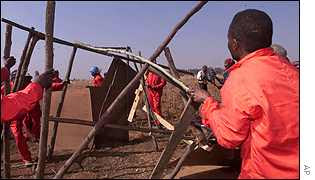Upon landing in South Africa, I had the pleasure to stay with Marc Wegerif (the brother of Andrew Wegerif, from Varmland, Sweden) and his family. It was a great way to get a quick introduction to the reality of the "new" South Africa.*
Andrew and his wife (Theresa Yates) have been heavily involved in Land Reform issues in South Africa for the last decade. Marc participated in the University of the Western Cape's Programme for Land and Agrarian Studies. In collaboration with others, Marc has published a book (which he kindly gave to me) entitled, "Still Searching for Security: The Reality of Farm Dweller Evictions in South Africa." The book is a thorough investigation into the continued attacks on poor blacks in rural areas, despite the "liberation" from apartheid.
Theresa, a Black American lawyer, began living in South Africa in 1996 under a Crane & Rogers foundation fellowship. Also known as the Institute of Current World Affairs, the foundation sends people to foreign countries for two years, on the condition that they write extensively about the social conditions they confront in whatever country they are in. Theresa's focus was specifically the successes and failures of the Mandela government in terms of implementing land reform. Her writing is powerful and tells an essential piece of recent history.
In short, Marc and Theresa expressed grave concern about the direction things are going right now as far as justice for the poor. Theresa put it bluntly, "Many mistakes are being made, and there isn't much indication that the situation is going to change any time soon." Since the ANC came to power, two million homes for poor people have been built, (but they are all in traditionally black areas, therefore not disrupting apartheid housing patterns) but a massive housing shortage (and extreme levels of poverty and unemployment going with it) persists.
Between Johannesburg and Pretoria there are currently over 200 illegal settlements, and some of these have as many as 40-50,000 people living on them. The evictions, and resistance against attempted evictions in these areas are a daily phenomenon. A special team of cops who dress in infamous red overalls (called "red ants") are notorious for brutal evictions and communities of squatters are attacking back, barricading themselves in (the morning traffic reports frequently include news of roads shut down by protestors) and even beating the red ants in order to stay in their homes. Returning to tactics from the Liberation days, angry township residents have killed a number of ANC officials in their areas, for failure to meet the needs of the community.

Upon arrival to the country in 1986, Marc set himself up with radical friends of his parents. And, in that time of militant upheaval and martial law response, the majority of his friends were in jail. Marc has been a white member of the ANC (he ran for city council on an ANC ticket, promising his wife that he would lose, solely to have challenging conversations with his white neighbors in the suburbs of pretoria. About South African whites Marc says, "They are, almost all, arrogant bastards, who have no gratitude, no idea what they have.") for many years, and remains dedicated to the radical potential of that politics. Rejecting totally his parents' christian vision of social change, he sees more hope in the empowering and autonomous tendencies of the Black Consciousness Movement (which he insists failed to take hold of the politics of the society exactly because it formed itself into formal organizations with party lines, and so on).
Marc and Theresa are, as well as can be expected, glad to be in South Africa, and committed to the work there. They have accepted certain basic, and unpleasant facts about the way of life there. Marc jokes about his swedish relatives (most of which he has quite rarely seen in the last 20+ years) that "none of them have a proper job, not a one of them; if i don't have a decent job in this country, my kids won't eat, and won't be taken care of if they get sick." Likewise, he is part of a neighborhood patrol that drives around at night to try and deter crime. This isn't an expression of the typical vigilante mentality that many whites have, just, "a basic precaution that must be taken."
Marc told me, "Maybe I'm a sell-out, maybe my brother is the only one living up to his ideals. He's a very principled man." But the situation is a lot more complex than that. In a very ugly and contradictory "liberated" society, Marc and Theresa are carrying on: pushing, pushing, pushing, bit by bit.
----
* After my first day in Pretoria, I was speaking with Theresa about the bustling African city I had visited, full of thousands of black faces and three or four white ones. She told me, "When I came in 1990, the black friends I made told me, 'see how much has changed, we're walking on the sidewalk now. Used to be that when we walked on the sidewalk, white folks would shove us into the street, so we started just walking in the street, near the curb.'"

No comments:
Post a Comment